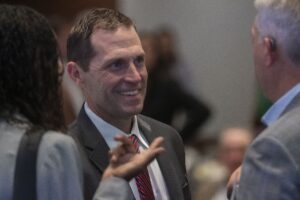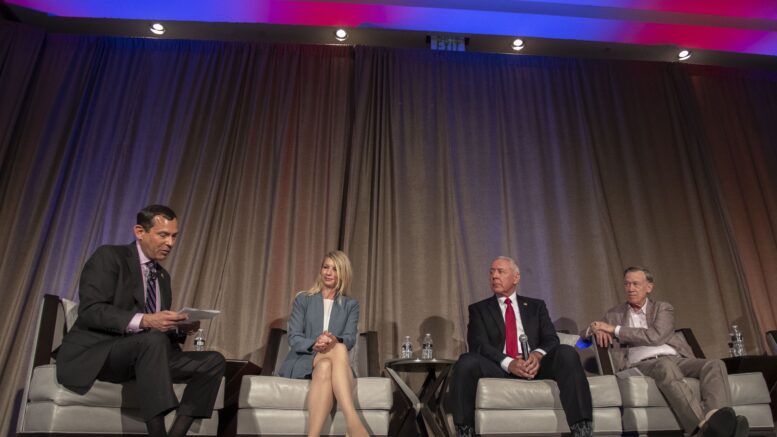As Colorado leaders begin discussions on how to address the state’s affordable-housing and workforce-shortage crises in the next legislative session, the state’s congressional delegation — or at least some of its members — suggested ways on Thursday that Congress could help too.
Speaking at the Colorado Chamber of Commerce’s biennial congressional luncheon, U.S. representatives and one of the state’s senators pointed to expansions of tax credits and rollbacks of regulatory barriers as paths they could take for the federal government to contribute to a state housing solution. Some also suggested that federal efforts to boost apprenticeships could supplement proposals that government and business officials are considering on how to align the talents of the workforce with those needed to bolster in-demand professions.
Together the two issues are expected to generate some of the biggest discussions when the Legislature reconvenes in January.
Gov. Jared Polis failed to push through a land-use reform bill this past session that was aimed at clearing obstacles to housing construction, and he is likely to bring back a similar bill in 2024. And employers continue to suffer from labor shortages that curtail production and operations, which in turn have sparked discussions on how to fill talent-development gaps.
Federal affordable-housing efforts
U.S. Rep. Joe Neguse, D-Boulder, suggested that while the state government is the primary vehicle to boost new housing construction, he would support reform of the federal Low-Income Housing Tax Credit program to allow for broader use of the incentive. He and Democratic U.S. Sen. Michael Bennet also are pushing a bill that would make it easier to convert unused federal property and buildings in areas like the state’s mountain regions into affordable housing.

U.S. Rep. Joe Neguse speaks at the Colorado Chamber of Commerce congressional luncheon on Thursday as U.S. Sen. John Hickenlooper and U.S. Rep. Yadira Caraveo listen.
“I think housing more broadly is probably the most pernicious issue facing Colorado for the next decade,” Neguse told a crowd of 280 people gathered at The Ritz-Carlton, Denver.
U.S. Rep. Brittany Pettersen, D-Lakewood, said she would support new federal tax incentives that could spur the construction of more affordable housing. She also said she would support laws to limit small groups of naysayers, often called NIMBYs, from blocking new housing developments, though she didn’t specify how such a law might work.
And Sen. John Hickenlooper said he would like to see an expansion of federal voucher programs to help people get into rental housing. The Democrat added too that he believes it’s key to raise workers’ salaries so that they can afford to purchase housing.
Congressional delegation on workforce
U.S. Rep. Jason Crow, D-Aurora, is co-sponsoring a pair of bills that he believes can help Colorado employers to offer apprenticeships more easily. One, which passed the House in 2022 but did not get through the Senate, would allow federal Small Business Development Centers to provide mentoring and counseling on how smaller employers can set up apprenticeship programs; the other would offer tax incentives to small businesses that offer the work-based learning opportunities.

U.S. Rep. Jason Crow speaks to attendees at the Colorado Chamber of Commerce congressional luncheon on Thursday.
“The startup costs (to launching apprenticeship programs) are not inconsequential,” Crow said, noting that Hickenlooper also has pushed for more funding of apprenticeships. “Those startup costs can sometimes be prohibitive, so providing a tax incentive on the front end can help.”
U.S. Rep. Yadira Caraveo, D-Thornton, said the federal government should contribute more funding for residency programs in health care, focusing particularly on training providers for nursing facilities that are desperately short-staffed. Pettersen, meanwhile, said that business leaders of all stripes have asked her to back immigration reform to allow more people entering and seeking to enter the country to work legally.
A dissenting voice
The one member of the panel who didn’t propose offering federal support to deal with the issues was Rep. Ken Buck, R-Windsor, who acknowledged housing and workforce development as “really important” state issues but argued they don’t fall under the federal purview.

U.S. Rep. Ken Buck answers a question at the Colorado Chamber of Commerce congressional luncheon Thursday while U.S. Sen. John Hickenlooper reacts.
Buck said the best thing the federal government, which needs to concentrate on paring back its spending for fear of endangering promised benefits to future retirees, could do is to not impede sectors such as the oil and gas industry and not raise taxes on employers.
“If we increase corporate income taxes, we are going to export jobs — manufacturing jobs, in particular — to other countries,” Buck said. “We have to cut spending.”
